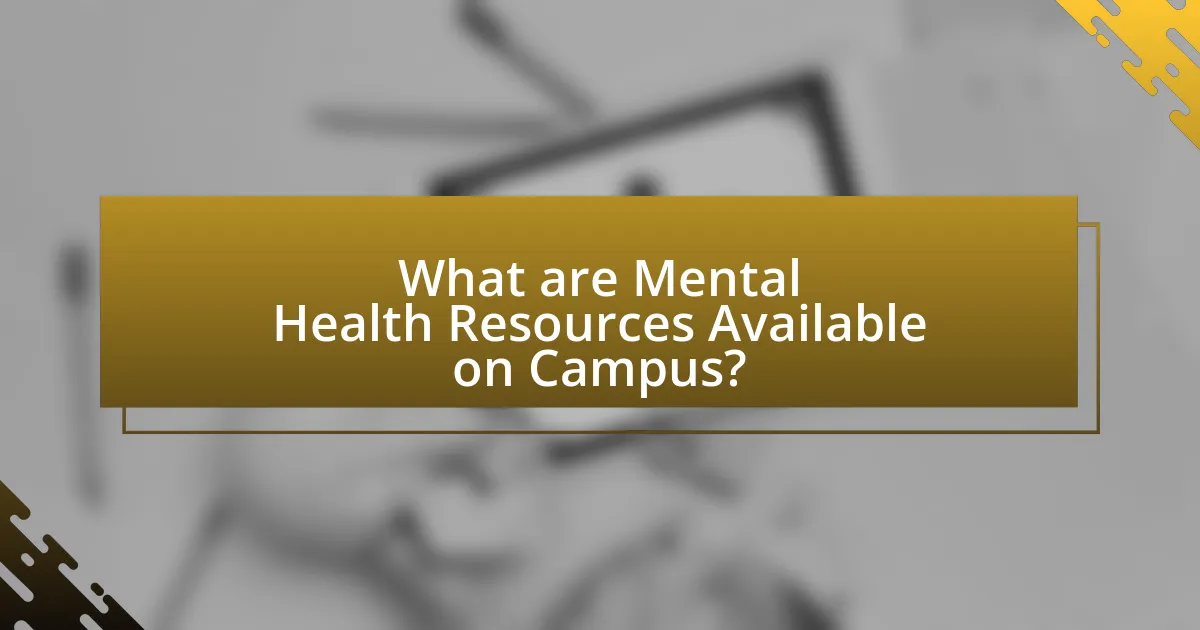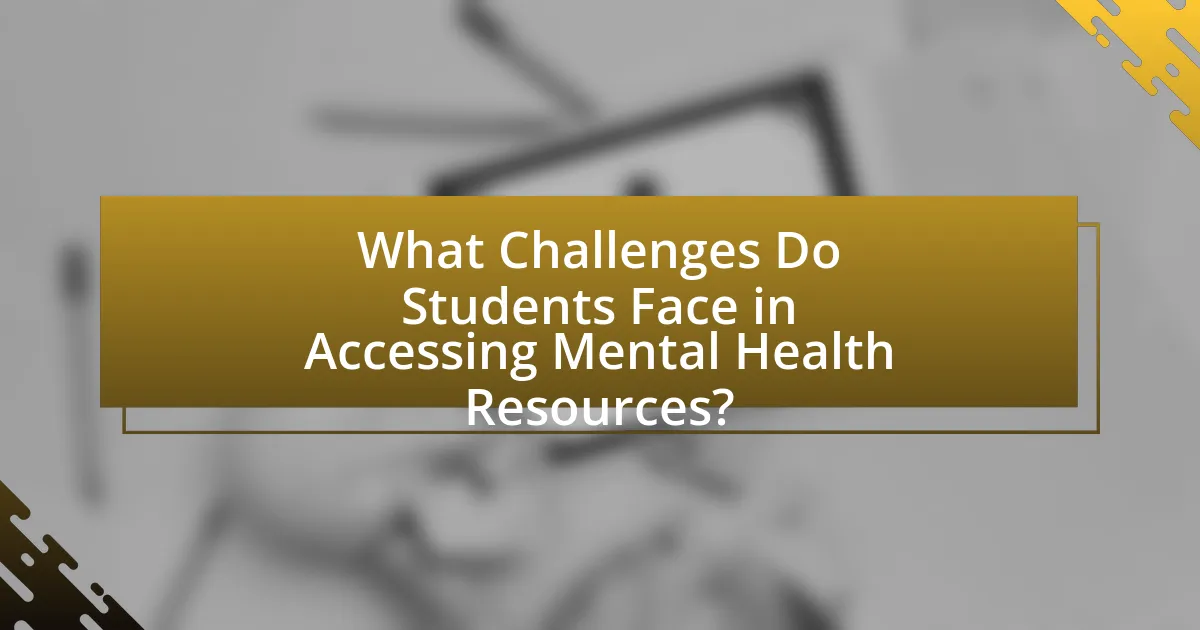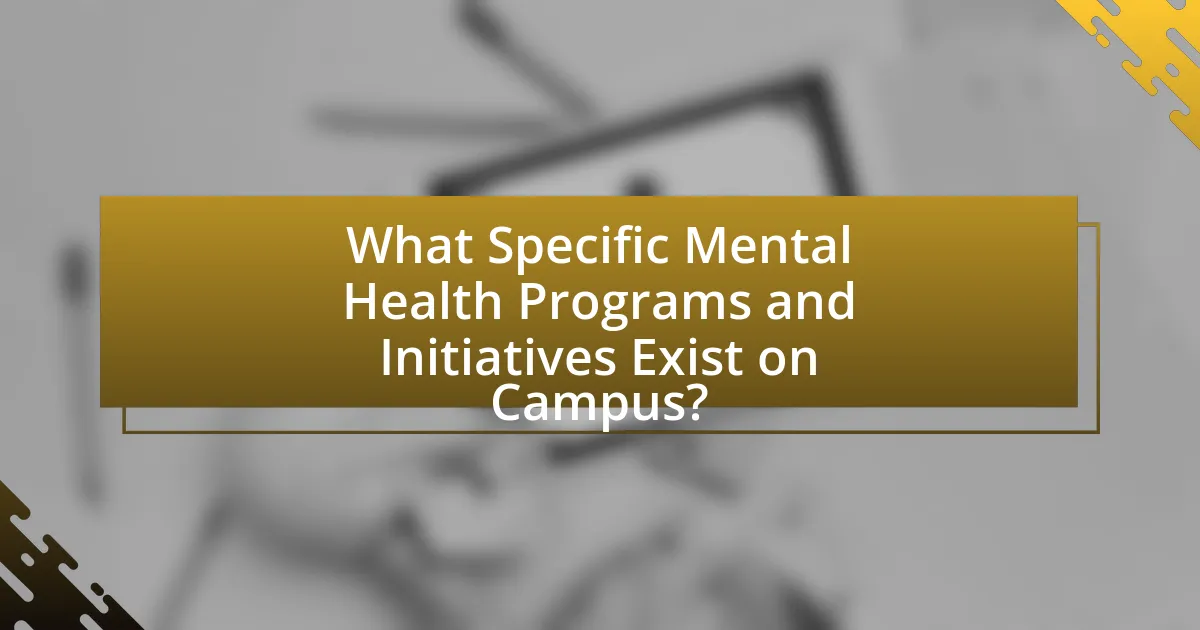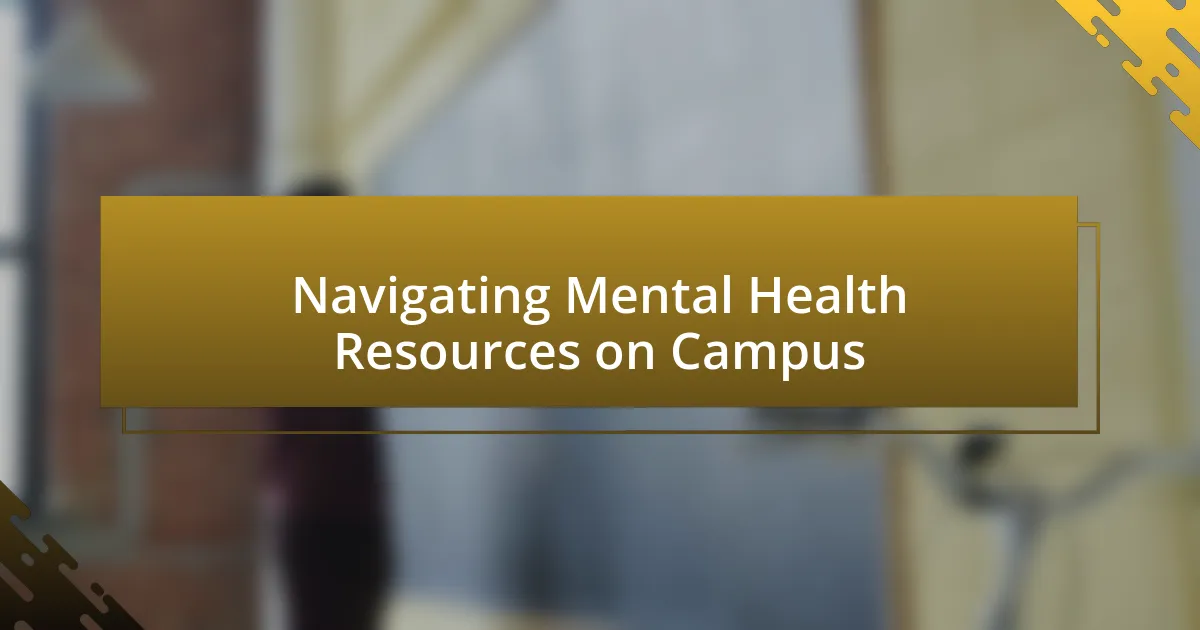The article focuses on navigating mental health resources available on college campuses, highlighting essential services such as counseling, workshops, peer support groups, and crisis intervention. It outlines how students can identify and access these resources, the importance of utilizing them for academic success and overall well-being, and the challenges they may face, including stigma and logistical barriers. Additionally, the article discusses specific mental health programs, their effectiveness, and practical tips for students to create personal mental health plans and seek help effectively. Overall, it emphasizes the critical role of mental health resources in supporting students during their academic journey.

What are Mental Health Resources Available on Campus?
Mental health resources available on campus typically include counseling services, mental health workshops, peer support groups, and crisis intervention services. Counseling services provide individual and group therapy sessions led by licensed professionals, addressing various mental health issues such as anxiety, depression, and stress management. Workshops often focus on skills development, coping strategies, and mental wellness education. Peer support groups offer a space for students to share experiences and support one another, fostering a sense of community. Crisis intervention services are available for immediate assistance during mental health emergencies, ensuring students receive timely help. These resources are essential for promoting mental well-being and supporting students in navigating their mental health challenges effectively.
How can students identify mental health resources at their institution?
Students can identify mental health resources at their institution by accessing the campus counseling center, which typically provides a range of services including individual therapy, group therapy, and crisis intervention. Additionally, students can consult the institution’s website, where mental health resources are often listed under student services or health services sections. Many universities also offer mental health awareness events and workshops, which can provide information on available resources. Furthermore, peer support groups and student organizations focused on mental health can serve as valuable sources of information. According to the American College Health Association, 61% of college students reported feeling overwhelming anxiety, highlighting the importance of readily accessible mental health resources on campuses.
What types of mental health services are typically offered on campus?
Campus mental health services typically include counseling services, psychological assessments, crisis intervention, and wellness programs. Counseling services provide individual and group therapy sessions to address various mental health issues, while psychological assessments help in diagnosing conditions. Crisis intervention services offer immediate support for students in distress, and wellness programs promote mental health awareness and coping strategies. These services are essential for supporting student well-being and academic success, as evidenced by studies showing that access to mental health resources can significantly improve student outcomes.
How can students access these services?
Students can access mental health services on campus by visiting the counseling center, which typically offers walk-in hours, scheduled appointments, and online resources. Many universities provide a dedicated website where students can find information about available services, including therapy sessions, workshops, and crisis support. Additionally, students can often access these services through mobile apps or hotlines specifically designed for mental health support, ensuring that help is readily available.
Why is it important to utilize mental health resources on campus?
Utilizing mental health resources on campus is crucial for promoting student well-being and academic success. Access to these resources helps students manage stress, anxiety, and other mental health challenges that can arise during their academic journey. Research indicates that students who engage with mental health services report improved emotional well-being and higher academic performance. For instance, a study published in the Journal of College Student Psychotherapy found that students who utilized counseling services experienced significant reductions in psychological distress and enhanced coping skills. Therefore, leveraging mental health resources on campus is essential for fostering a supportive environment that enables students to thrive both personally and academically.
What impact does mental health have on academic performance?
Mental health significantly impacts academic performance by influencing cognitive functions, motivation, and overall well-being. Students experiencing mental health issues, such as anxiety or depression, often face difficulties in concentration, memory retention, and time management, which can lead to lower grades and increased dropout rates. Research published in the Journal of American College Health indicates that students with mental health concerns are more likely to report poor academic performance, with 30% of students citing mental health as a barrier to their academic success. This correlation underscores the importance of addressing mental health to enhance educational outcomes.
How can mental health resources contribute to overall well-being?
Mental health resources significantly contribute to overall well-being by providing individuals with access to support, education, and coping strategies that enhance emotional and psychological health. These resources, such as counseling services, workshops, and peer support groups, help individuals manage stress, anxiety, and depression, which are prevalent issues in academic environments. Research indicates that students who utilize mental health services report improved academic performance and higher levels of life satisfaction. For instance, a study published in the Journal of College Student Psychotherapy found that students who engaged with mental health resources experienced a 30% reduction in symptoms of anxiety and depression, leading to better overall well-being.

What Challenges Do Students Face in Accessing Mental Health Resources?
Students face several challenges in accessing mental health resources, including stigma, lack of awareness, and insufficient availability of services. Stigma surrounding mental health issues often prevents students from seeking help due to fear of judgment or discrimination. Additionally, many students are unaware of the mental health resources available to them, which can lead to underutilization of these services. Furthermore, a study by the American College Health Association found that 63% of college students reported feeling overwhelmed by anxiety, yet many institutions struggle to provide adequate mental health support due to limited funding and staffing, resulting in long wait times for appointments and insufficient resources to meet demand.
What barriers might prevent students from seeking help?
Barriers that might prevent students from seeking help include stigma, lack of awareness, and accessibility issues. Stigma surrounding mental health can lead to feelings of shame or fear of judgment, discouraging students from reaching out for support. Additionally, many students may not be aware of the mental health resources available to them on campus, which can hinder their ability to seek help. Accessibility issues, such as long wait times for appointments or inconvenient service hours, can further deter students from utilizing these resources. Research indicates that approximately 40% of college students report feeling too embarrassed to seek help, highlighting the significant impact of stigma on help-seeking behavior.
How do stigma and misconceptions affect students’ willingness to seek help?
Stigma and misconceptions significantly reduce students’ willingness to seek help for mental health issues. Research indicates that students often fear judgment or discrimination from peers and faculty, which discourages them from accessing necessary support services. For instance, a study published in the Journal of American College Health found that 60% of students with mental health concerns reported feeling embarrassed about seeking help, primarily due to stigma. Additionally, misconceptions about mental health, such as the belief that seeking help is a sign of weakness, further exacerbate this reluctance. These factors create a barrier to utilizing mental health resources on campus, ultimately impacting students’ well-being and academic performance.
What logistical issues can hinder access to mental health services?
Logistical issues that can hinder access to mental health services include transportation barriers, limited service hours, and inadequate staffing. Transportation barriers often prevent individuals from reaching mental health facilities, especially in rural areas where public transport options are scarce. Limited service hours can restrict access for students who have classes or work commitments, making it difficult to schedule appointments. Inadequate staffing leads to long wait times for appointments, which can discourage individuals from seeking help. According to a study by the American Psychological Association, 60% of college students reported that long wait times negatively impacted their ability to access mental health services.
How can students overcome these challenges?
Students can overcome challenges in navigating mental health resources on campus by actively seeking information and utilizing available support systems. Engaging with campus mental health services, attending workshops, and participating in peer support groups can provide essential guidance and resources. Research indicates that students who utilize campus mental health services report improved well-being and academic performance, highlighting the effectiveness of these resources. Additionally, fostering open communication with faculty and peers can create a supportive environment that encourages seeking help when needed.
What strategies can be employed to reduce stigma on campus?
To reduce stigma on campus, institutions can implement awareness campaigns that educate students about mental health issues. These campaigns can include workshops, seminars, and peer-led discussions that promote understanding and empathy towards individuals experiencing mental health challenges. Research indicates that educational interventions can significantly decrease stigma; for instance, a study published in the journal “Psychological Medicine” found that stigma reduction programs led to a 30% increase in positive attitudes towards mental health among participants. Additionally, creating safe spaces for open dialogue, such as support groups or mental health forums, encourages students to share their experiences and fosters a supportive community.
How can institutions improve accessibility to mental health resources?
Institutions can improve accessibility to mental health resources by implementing comprehensive outreach programs that raise awareness and reduce stigma. Research indicates that universities with proactive mental health campaigns see a 30% increase in student engagement with available services. Additionally, providing online resources and telehealth options can enhance access for students who may face barriers to in-person visits. A study published in the Journal of American College Health found that institutions offering virtual counseling saw a 40% increase in utilization rates. Furthermore, training faculty and staff to recognize mental health issues and refer students to appropriate resources can create a supportive environment, leading to improved mental health outcomes.

What Specific Mental Health Programs and Initiatives Exist on Campus?
Specific mental health programs and initiatives on campus include counseling services, peer support groups, mental health awareness workshops, and stress management seminars. Counseling services provide individual and group therapy sessions, addressing a range of mental health issues. Peer support groups offer a platform for students to share experiences and coping strategies, fostering community and connection. Mental health awareness workshops educate students on recognizing mental health challenges and available resources. Stress management seminars equip students with techniques to handle academic and personal stress effectively. These initiatives aim to enhance student well-being and promote a supportive campus environment.
What types of programs are available for mental health support?
Various types of programs are available for mental health support, including counseling services, peer support groups, workshops, and crisis intervention services. Counseling services typically offer one-on-one or group therapy sessions led by licensed professionals, addressing issues such as anxiety, depression, and stress management. Peer support groups provide a platform for individuals to share experiences and coping strategies in a supportive environment. Workshops often focus on skill-building in areas like mindfulness, resilience, and emotional regulation. Crisis intervention services are designed to assist individuals in immediate distress, providing urgent support and resources. These programs are commonly found on college campuses, aiming to enhance student well-being and academic success.
How do peer support programs function?
Peer support programs function by connecting individuals who share similar experiences, allowing them to provide emotional support, share coping strategies, and foster a sense of community. These programs typically involve trained peer supporters who facilitate discussions, offer guidance, and create safe spaces for participants to express their feelings. Research indicates that peer support can enhance mental well-being, as evidenced by a study published in the Journal of Mental Health, which found that participants in peer support programs reported lower levels of anxiety and depression compared to those who did not engage in such programs.
What role do workshops and seminars play in mental health education?
Workshops and seminars play a crucial role in mental health education by providing structured environments for learning and discussion about mental health topics. These events facilitate the dissemination of knowledge, promote awareness, and encourage open dialogue among participants, which can lead to reduced stigma surrounding mental health issues. Research indicates that educational workshops can significantly improve participants’ understanding of mental health, as evidenced by a study published in the Journal of Mental Health, which found that 75% of attendees reported increased knowledge and awareness after participating in such programs. Additionally, workshops often include interactive components, allowing individuals to engage with mental health professionals and peers, thereby fostering a supportive community that enhances overall mental well-being.
How effective are these programs in supporting student mental health?
Mental health programs on campus are highly effective in supporting student mental health, as evidenced by various studies showing significant improvements in student well-being. For instance, a study published in the Journal of American College Health found that students who participated in mental health programs reported a 30% decrease in anxiety and depression symptoms. Additionally, the National Alliance on Mental Illness reported that campuses with comprehensive mental health services saw a 50% increase in students seeking help, indicating that these programs not only provide support but also encourage students to utilize available resources.
What evidence exists to support the effectiveness of campus mental health initiatives?
Research indicates that campus mental health initiatives significantly improve student well-being and academic performance. A study published in the Journal of American College Health found that students who participated in mental health programs reported a 20% decrease in depressive symptoms and a 15% increase in academic performance. Additionally, the National Alliance on Mental Illness reported that campuses with comprehensive mental health services saw a 30% increase in student engagement and retention rates. These findings demonstrate the positive impact of mental health initiatives on student outcomes.
How can students provide feedback to improve these programs?
Students can provide feedback to improve mental health programs on campus through structured surveys and focus groups. These methods allow students to express their experiences and suggestions directly to program administrators. Research indicates that feedback collected through surveys can lead to a 20% increase in program effectiveness when implemented properly, as it helps identify specific areas for improvement. Additionally, focus groups facilitate in-depth discussions, enabling students to share nuanced insights that surveys may not capture.
What Practical Tips Can Students Use to Navigate Mental Health Resources on Campus?
Students can effectively navigate mental health resources on campus by familiarizing themselves with available services, utilizing online platforms, and engaging with peer support groups. Familiarization involves reviewing the campus mental health website to understand the types of services offered, such as counseling, workshops, and crisis intervention. Online platforms, including mental health apps and university portals, provide easy access to resources and appointment scheduling. Engaging with peer support groups fosters a sense of community and shared experience, which can enhance emotional well-being. Research indicates that students who actively seek and utilize mental health resources report improved mental health outcomes, highlighting the importance of proactive engagement.
How can students create a personal mental health plan?
Students can create a personal mental health plan by identifying their mental health needs, setting specific goals, and outlining actionable steps to achieve those goals. First, students should assess their current mental health status by reflecting on their feelings, stressors, and coping mechanisms. Next, they should establish clear, measurable goals, such as improving sleep quality or reducing anxiety levels. Finally, students must develop a plan that includes daily practices, such as mindfulness exercises, regular physical activity, and scheduled check-ins with mental health professionals or support groups. Research indicates that structured mental health plans can lead to improved well-being and resilience, as evidenced by studies showing that goal-setting enhances motivation and accountability in mental health management.
What steps should students take when they first seek help?
Students should first identify their specific needs and concerns when seeking help. This involves reflecting on their mental health challenges, such as anxiety, depression, or stress, to articulate these issues clearly. Next, students should locate the appropriate mental health resources available on campus, such as counseling centers or support groups. After identifying the resources, students should reach out to schedule an appointment, either through online platforms or by visiting the office in person. It is also beneficial for students to prepare for the initial meeting by writing down questions or topics they wish to discuss, ensuring they make the most of their time with the mental health professional. These steps are crucial as they facilitate a structured approach to seeking help, which can lead to more effective support and interventions.

Leave a Reply